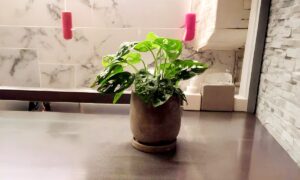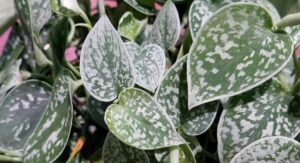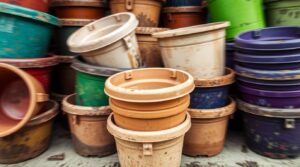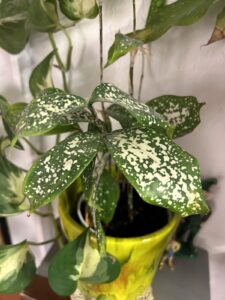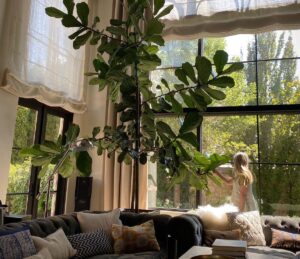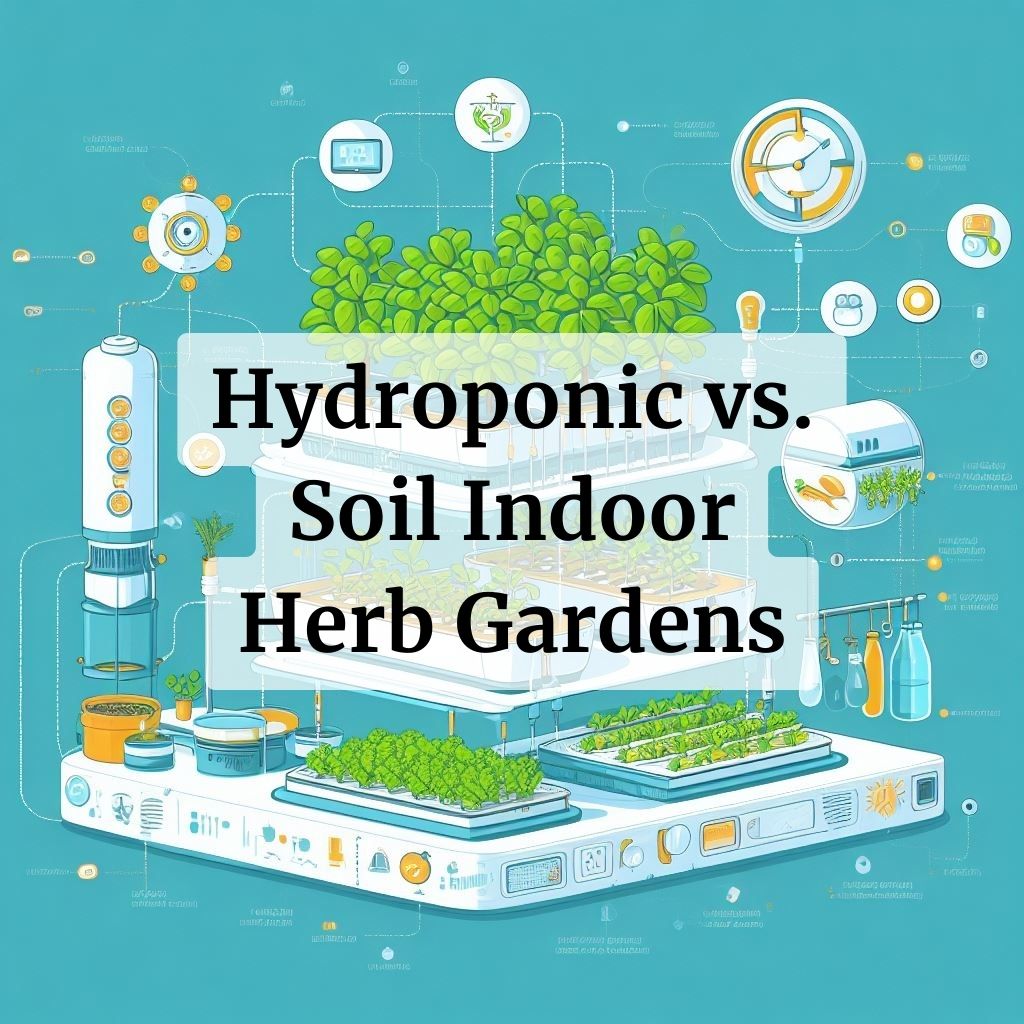
In this comprehensive guide, we’ll take an in-depth look at the differences, pros and cons, costs and maintenance between hydroponic and soil indoor herb gardens, assisting you in making an informed decision that aligns with your preferences and requirements. Let’s get started:
In this article
Understanding Hydroponics
Hydroponics isn’t just a method; it’s a modern agricultural marvel, and understanding its nuances is essential for anyone looking to venture into the realm of indoor herb gardening.
This innovative approach to cultivation defies tradition by eliminating soil from the equation. Instead, it relies on a meticulously balanced concoction of water, nutrients, and a dash of horticultural wizardry to nourish your herbs. It’s as if your herbs have swapped their gardening boots for dancing shoes, grooving to the rhythm of hydroponic perfection.
At its core, hydroponics is all about control. It provides an environment where you hold the reins of nature. With soil out of the picture, you become the maestro, composing the ideal conditions for your herbs to thrive. This level of control allows you to fine-tune every element of their growth, from nutrient intake to pH levels. The result is healthier, more vibrant plants that seem to dance to a healthier tune.
One of the most remarkable aspects of hydroponics is its water-saving prowess. In a world where water is an increasingly precious resource, hydroponics shines. The nutrient solution is recirculated, minimizing wastage and ensuring that every drop counts. While traditional soil gardens can be like leaky faucets, hydroponics is the water-efficient marvel that lets you cultivate your herbs without guilt.
Hydroponic gardens also have less pests and diseases. Soil gardens can sometimes resemble a tempting buffet for unwelcome critters, but hydroponics creates a fortress-like defense against these intruders. The controlled environment, sterile conditions, and precise nutrient delivery system keep your herbs safe and healthy.
One of the most enticing aspects of hydroponics is the speed at which herbs grow. It’s like watching nature on fast forward. If you’re an enthusiastic cook who craves fresh herbs daily, hydroponics can be a culinary lifesaver. Herbs seem to sprout, grow, and flourish at an astonishing pace, allowing you to indulge in a garden-to-table experience that is nothing short of magical.
However, hydroponics comes with its challenges. Setting up a hydroponic system has a steep learning curve. You need to understand the optimal nutrient ratios, pH levels, and environmental conditions for each herb in your garden. It’s a bit like taming a technological beast, and beginners may find it intimidating.
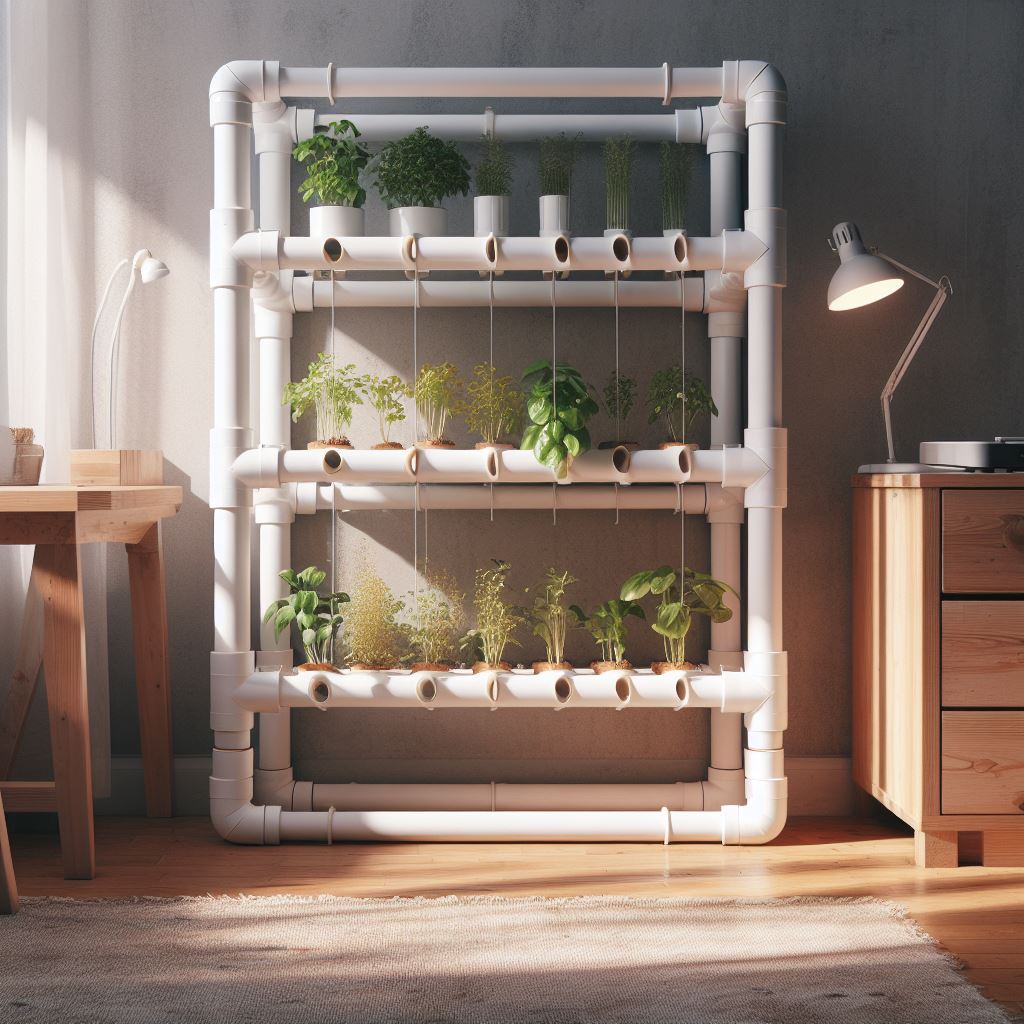
Cost is another factor to consider. The initial investment in a hydroponic setup may raise eyebrows. Hydroponic systems can be intricate and often require specialized equipment like pumps, grow lights, and pH meters. However, it’s essential to weigh this against the potential long-term savings and the increased yields that hydroponics can offer.
In essence, hydroponics is a dance of life without soil as the dance floor. It’s a precise, efficient, and innovative method of herb gardening that can yield bountiful results with the right knowledge and care.
The Differences between Soil and Hydroponics
| Soil Gardens | Hydroponics | |
|---|---|---|
| Space | Sprawling fields that require ample space | Compact setups, like a herb-packed skyscraper |
| Watering | Thirsty like camels, consuming more water | Precision watering system with minimal waste |
| Pests and Diseases | Vulnerable to pests and diseases | Controlled environment for pest defense |
| Efficiency and Time | Slower growth, requiring more patience | Faster growth, sprinter’s pace for quicker results |
| Price | Lower initial investment | Initial cost higher, but potential long-term savings |
A Comprehensive Comparison
| Hydroponics | Soil Gardens | |
|---|---|---|
| Health of Plants | Robust health due to nutrient control | Less consistency in plant health |
| Efficiency | Faster growth, herbs are speedsters | Slower growth, akin to a leisurely stroll |
| Water Conservation | Efficient use of water, eco-conscious | Less water-efficient, can be like a leaky faucet |
| Cost | Higher initial cost, long-term savings | Lower initial investment |
| Ease of Use | Automation and precision, easier to manage | Rustic charm but labor-intensive |
| Yield | Higher yield per square foot | Lower yield compared to hydroponics |
| Impact of External Factors | Controlled environment, predictable | Influenced by weather and soil quality |
| Space Saving | Space-efficient, ideal for urban gardens | Requires more real estate |
Soil Indoor Gardens
Soil is a favorite among gardening traditionalists. There’s something undeniably charming about digging your hands into the earth and nurturing plants through tried-and-true methods.
In a soil garden, your herbs are grounded in the very essence of nature. They draw nutrients from the soil, forming a connection with the environment that many gardeners find spiritually rewarding.
Soil is forgiving, making it a fantastic choice for beginners. It’s less demanding in terms of setup and maintenance. You can start a soil herb garden with just a pot, some soil, and herb seeds or seedlings. It’s gardening in its simplest, most primal form.
But here’s the catch: soil gardens can be a haven for pests and diseases. Unwanted guests like aphids, snails, or fungi might set up camp in your soil, demanding your attention and possibly harmful chemical interventions.
The pace of growth in soil gardens is typically slower than hydroponics. It’s like the difference between a leisurely Sunday stroll and a sprint. You’ll need more patience when waiting for your herbs to mature.
Soil Grown Plants vs. Hydroponics: Pros and Cons
Why Choose Hydroponics?
Choose hydroponics if you’re an efficiency enthusiast. It’s all about precise control, faster growth, reduced water consumption, and a near-immunity to pests and diseases. If you’re a tech-savvy gardener who enjoys experimenting with the perfect nutrient cocktail, hydroponics is your playground.
Why Not Choose Hydroponics?
Avoid hydroponics if you’re not ready for the initial learning curve and the potential higher upfront costs. It’s a bit like being the captain of a spaceship, and not everyone is ready for liftoff.
Why Choose Soil?
Opt for soil if you value tradition and simplicity. Soil gardens offer a direct connection to nature, making gardening a wholesome, grounding experience. They’re ideal for beginners and those who appreciate the slower, more traditional pace of growth.
Why Not Choose Soil?
Don’t choose soil if you dread battling pests, have limited space, or crave faster herb growth. Soil gardens require more real estate, and they can be magnets for plant pests and diseases. If you’re impatient or space-constrained, you might find soil gardening a bit frustrating.
Which is Right for You?
The ultimate choice between hydroponics and soil depends on your personal preferences, lifestyle, and gardening goals. Are you the hands-on gardener who loves the traditional feel of soil between your fingers, or are you the tech-savvy, efficiency-driven gardener ready to embrace the future of hydroponics? In the end, the right choice is the one that lets you grow your herbs with joy and satisfaction.
Reasons Why Hydroponics Wins
In the competitive arena of indoor herb gardening, hydroponics emerges as a formidable champion for numerous reasons:
Space Savings
Hydroponics masters the art of compact gardening. It allows you to grow more herbs in less space. Imagine having a lush herb garden on your kitchen countertop or even on a vertical shelf, where every square inch becomes a potential green haven.
Water Conservation
In an era where water conservation is paramount, hydroponics is the eco-hero of herb cultivation. Traditional soil gardens often let precious water seep away, but hydroponics is a precision watering system. It recirculates water, ensuring that every drop nourishes your herbs. The result? Less water wastage and a greener conscience.
No Weeding Necessary
Weeding is the bane of every gardener’s existence. In soil gardens, you might find yourself endlessly battling unwanted intruders. But in the hydroponic world, you can bid farewell to this tedious chore. Your herb garden remains a pristine sanctuary, free from invasive weeds.
Less Pests and Diseases
Picture a fortress protecting your herbs. That’s what hydroponics offers when it comes to pests and diseases. Soil gardens, unfortunately, can be a welcoming haven for aphids, snails, and various plant ailments. Hydroponics creates a protective bubble, substantially reducing the risk of garden pets and diseases.
Time Savings
For those who value time as much as their herbs, hydroponics delivers results fast. Herbs in hydroponic systems often grow at a sprinter’s pace, meaning you’ll be able to enjoy that fresh basil in your pasta sauce or a handful of mint in your mojito sooner than you think.
Control
With hydroponics, you’re in control of your herb garden like a scientist in a lab. You dictate every aspect of your herbs’ lives, from nutrient intake to lighting conditions. It’s gardening with a level of precision and control that’s difficult to achieve in traditional soil-based methods.
Scientific Exploration
Hydroponics isn’t just gardening; it’s a scientific adventure. Experiment with nutrient mixes, growth conditions, and even the ideal pH levels. It’s an opportunity to become a mad scientist of herb cultivation, constantly fine-tuning your methods for optimal results.
Advantages and Disadvantages
Now, let’s dive deeper into the heart of hydroponics to understand its advantages and disadvantages.
Hydroponics Advantages and Disadvantages
| Hydroponics Advantages | Hydroponics Disadvantages |
|---|---|
| – Precise nutrient control | – Initial learning curve |
| – Faster growth | – Higher setup costs |
| – Water-efficient | |
| – Pest and disease resistance | |
| – Space-saving | |
| – Automation and ease of management |
Soil Advantages and Disadvantages
| Soil Advantages | Soil Disadvantages |
|---|---|
| – Connection with nature | – Prone to pests and diseases |
| – Simplicity | – Slower growth |
| – Lower initial investment | – Higher water consumption |
Costs – Hydroponic vs. Soil
Let’s talk money.
When it comes to costs, there are several factors to consider when deciding between hydroponic and soil indoor herb gardens. Here is a breakdown of the setup and ongoing costs for each:
Setup Costs for Hydroponics
- Low-Tech Hydroponic System: $50 to $200
- Medium-Tech Hydroponic System: $200 to $500
- High-Tech Hydroponic System: $500 to $1,000
Ongoing Costs for Hydroponics
- Hydroponic technology: $50 to $10,000
- Reservoir container: $50 to $300
- Pots for plants: relatively inexpensive
Setup Costs for Soil
- Potted plants in soil: lower startup costs
Ongoing Costs for Soil
- Soil-based systems: contain pods with traditional potting soil that you can plant seeds into and water periodically
- Buying seeds and pods: some indoor herb gardens require the use of the brand’s seeds or pods, while others allow you to buy your own seeds
In summary, DIY hydroponic systems have higher setup costs than soil-based systems, but they require less ongoing maintenance. Soil-based systems have lower startup costs, but they require more ongoing maintenance.
At the end of the day, the choice between hydroponic and soil-based systems ultimately depends on personal preference and budget.
Frequently Asked Questions
Which method is better for beginners, hydroponics, or soil gardening?
Soil gardening is generally more beginner-friendly. It’s a straightforward and traditional method, making it accessible to those who are new to gardening. Hydroponics, on the other hand, can be more complex, requiring a learning curve to understand factors like nutrient ratios, pH levels, and environmental control. However, with some research and dedication, beginners can successfully venture into hydroponics.
What are the typical setup costs for a hydroponic herb garden?
The setup costs for a hydroponic herb garden can vary widely depending on factors like the size of the garden, the complexity of the system, and the types of equipment used. In a small-scale setup for home use, you might spend a few hundred to a few thousand dollars. This includes expenses for items like grow lights, pumps, reservoirs, growing media, and nutrient solutions. It’s crucial to research and plan your setup based on your specific needs and budget.
Can I grow all types of herbs using hydroponics?
Yes, you can grow a wide variety of herbs using hydroponics. Herbs like basil, mint, parsley, oregano, and thyme thrive in hydroponic systems. However, some herbs may be more challenging due to specific requirements, so research the particular needs of the herbs you wish to grow. With the right adjustments to your hydroponic system, you can cultivate a diverse selection of herbs.
Happy gardening!

